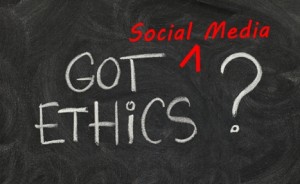 Many lawyers are scared of using social media because they fear violations of their state’s Rules of Professional Conduct. Social media is a great channel for online brand awareness and client acquisition so there is no need to avoid it out of fear. All you have to do is educate yourself. Below are some basic principles on how to use social media ethically and effectively. I have included some LinkedIn profiles as examples but the principles apply across all social media channels. *I have based my research largely on NY and California’s Rules of Professional Responsibility and several states’ opinions. I provide a summary but, as with any guidance you may receive from a credible blog post, I encourage you to read your state’s rules on professional conduct.
Many lawyers are scared of using social media because they fear violations of their state’s Rules of Professional Conduct. Social media is a great channel for online brand awareness and client acquisition so there is no need to avoid it out of fear. All you have to do is educate yourself. Below are some basic principles on how to use social media ethically and effectively. I have included some LinkedIn profiles as examples but the principles apply across all social media channels. *I have based my research largely on NY and California’s Rules of Professional Responsibility and several states’ opinions. I provide a summary but, as with any guidance you may receive from a credible blog post, I encourage you to read your state’s rules on professional conduct.
1) Professional Rules of Responsibility apply
Rules on attorney advertising and solicitation apply to social media profiles and postings that you use for business purposes and that concern the availability for professional employment. But what does “business purpose” mean? What does “the availability for professional employment” mean? Put your lawyer hats aside and stop trying to find loopholes. Assume that all of your social media channels, besides your personal Facebook page, is used for business purposes. Best practice is to avoid mentioning anything about your firm or line of work on your personal Facebook page.
2) You are responsible for everything that is posted on your profile or social media
You are responsible for everything that you or someone directed by you (ie: an agent) posts on your social media channels. You are also charged with monitoring your social media channels. If someone posts something misleading or false, you are required to take it down and if you can’t you must ask the person in charge to take it down. Alternatively, you can also make a corrective statement. On LinkedIn, people are able to endorse you and write reviews about you. On Facebook, people are able to write reviews about you. Make sure you are monitoring all of these for any false or misleading statements.
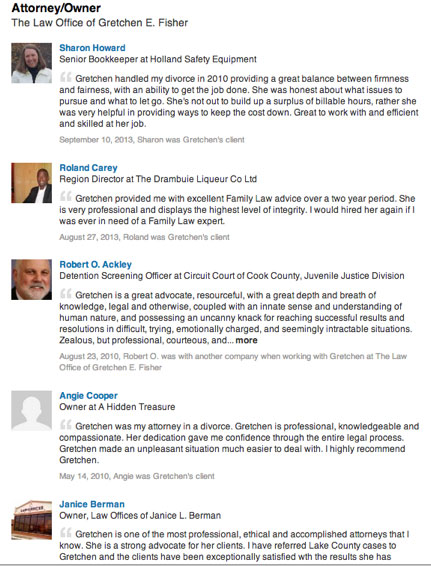
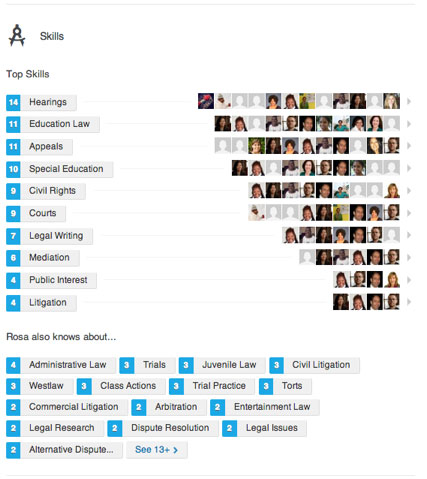
3) Don’t hold yourself out as a specialist when you are not
In your LinkedIn profile, avoid using the words expert or specialist unless you are certified by your jurisdiction(s) as such. To be on the safe side, stick to listing the number of years you have practiced and recent cases (those that are public) you have worked on.
4) Don’t release any confidential information regarding your clients
I know I am stating the obvious golden rule, however some lawyers have gotten in trouble for releasing privileged information on the internet. Do not do this unless the client consents. And even then, do so very judiciously. In one instance, an attorney was suspended for using confidential client information when rebuffing some allegations written on Yelp.
5) Make sure you put the word ‘advertising’ somewhere in your posts or profiles
For example, you can use the following disclaimer on your Twitter and Facebook pages:
“Posts may be considered attorney advertising under certain rules of professional attorney conduct”
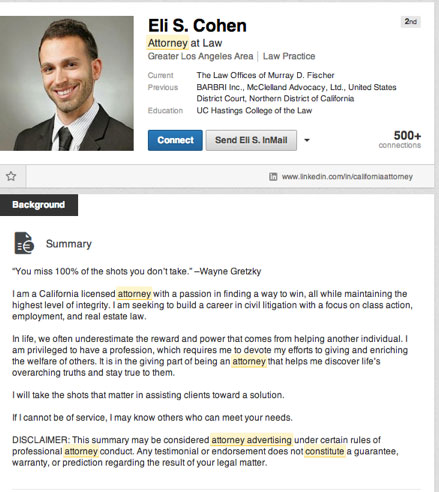
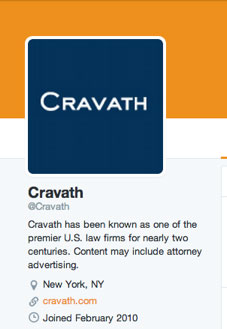
6) Make clear what jurisdictions(s) you are licensed to practice in to avoid UPL violation
Because social media and the internet see no geographic boundaries, you should clearly state what state(s) or jurisdictions(s) you are licensed to practice in all of your social media profiles.
7) Make sure you clearly state that prior results don’t guarantee future outcomes
On LinkedIn and Facebook, past clients may leave reviews or endorsements. You want to make sure that you include a disclaimer similar to what you include on your website that informs visitors that previous results don’t necessarily guarantee future outcomes. The following disclaimer can be used:
“Any endorsement or testimonial does not constitute a guarantee, warranty, or prediction on the outcome of your legal matter”
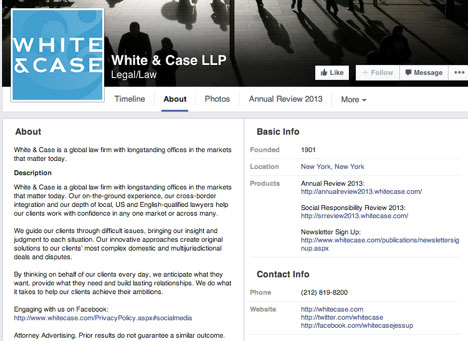
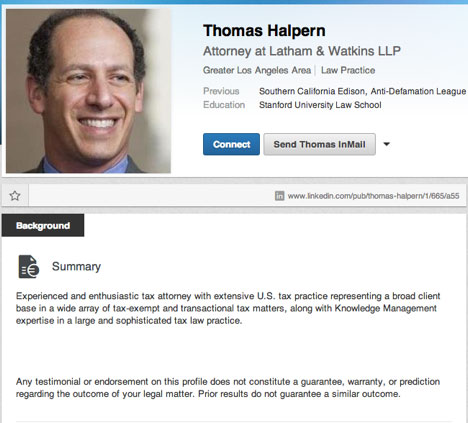
8) Encourage visitors that come across you via social media to contact you by phone
It is best to bring the conversation offline as soon as possible so as to avoid any ethical lapses on your part. To avoid inadvertently creating an attorney client relationship, you can use the following disclaimer in your LinkedIn profile:
“No attorney-client relationship is created when you contact me. Please do not include any confidential information in your communications. I encourage you to visit my website [lawfirm.com] or call me at [phone #] for a (free) consultation of your case”
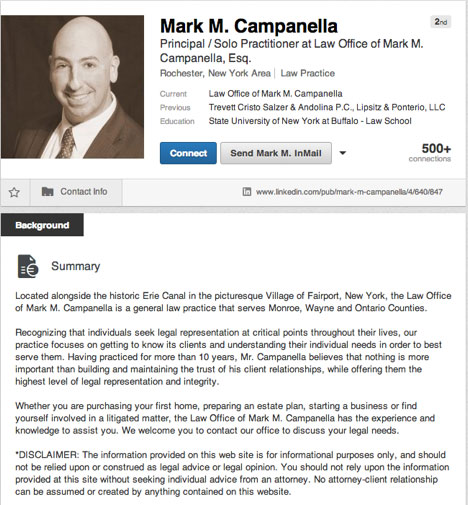
Resources:
- http://ethics.calbar.ca.gov/Portals/9/documents/Opinions/CAL%202012-186%20%2812-21-12%29.pdf
- http://www.morganlewis.com/documents/PABarAssoc_EthicalObligationsAttorneysSocialMedia.pdf
- http://www.nysba.org/workarea/DownloadAsset.aspx?id=47547
All opinions, advice, and experiences of guest bloggers/columnists are those of the author and do not necessarily reflect the opinions, practices or experiences of Solo Practice University®.






















Comments are closed automatically 60 days after the post is published.